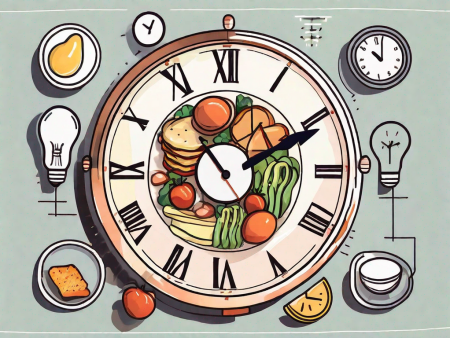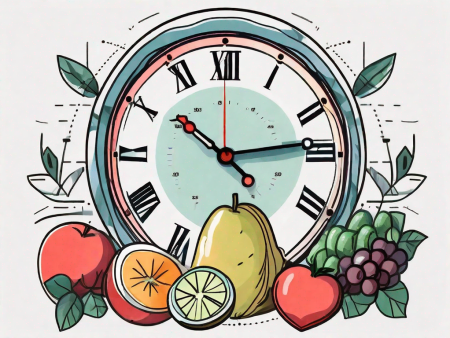Discover the fascinating relationship between copper and metabolism in this informative article.
How Does Copper Affect Metabolism?
Copper, often known for its shiny reddish hue, isn’t just a pretty metal – it plays a vital role in our body’s metabolism! Yes, that means copper isn’t just for pennies anymore. So grab your magnifying glass and embark on a journey to uncover the captivating world of copper and its influence on metabolism.

Understanding the Role of Copper in the Human Body
Before we dive into the nitty-gritty, let’s talk about why copper is essential for our health. Copper, my friends, is an absolute must for our bodies to function properly. It acts as a trusty sidekick in numerous bodily functions, so don’t let its shiny exterior fool you!
The Essentiality of Copper for Health
First and foremost, copper is a crucial component of many enzymes that are responsible for our body’s chemical reactions. These enzymes need copper’s helping hand to carry out their metabolic tasks with finesse. Without copper, our metabolism would be in shambles, stumbling around like a caffeine-deprived hamster in a wheel.
But that’s not all! Copper also plays a vital role in the production of red blood cells. These cells are responsible for carrying oxygen throughout our body, ensuring that all our organs and tissues receive the oxygen they need to function optimally. Without copper, our blood cells would be like lost little wanderers, unable to find their way and leaving our body starved of oxygen.
Furthermore, copper is an essential player in the maintenance of our immune system. It helps in the production of white blood cells, the superheroes of our immune system that fight off harmful invaders like bacteria and viruses. Without copper, our immune system would be like an army without its soldiers, leaving us vulnerable to infections and diseases.
Copper’s Role in Various Bodily Functions
But wait, there’s more! Copper doesn’t just stop at metabolism, blood cell production, and immune system support – it’s a multitasking mineral that loves to wear many hats.
Did you know that copper also plays a crucial role in the formation of connective tissue? Connective tissue is like the glue that holds our body together, providing support and structure to our organs, muscles, and bones. Without copper, our connective tissue would be weak and fragile, leaving our body vulnerable to injuries and instability.
Not only that, copper also lends a helping hand in the absorption of iron. Iron is an essential mineral that is responsible for carrying oxygen in our bloodstream. Copper assists in the conversion of iron into a form that our body can readily absorb and utilize. Without copper, our iron levels would be out of balance, leading to anemia and a whole array of health issues.
And if that’s not impressive enough, copper even plays a role in the production of melanin, the pigment responsible for our lovely hair and skin color. It helps in the activation of an enzyme called tyrosinase, which is involved in the production of melanin. Without copper, our hair would lose its luster, and our skin would lose its natural radiance.
As you can see, copper truly knows how to show off its versatility! It’s not just a shiny metal, but a vital element that keeps our body functioning like a well-oiled machine.
The Connection Between Copper and Metabolism
Now that we understand copper’s importance, let’s unravel how it influences our metabolism like a superstar influencer on social media. Copper is like the conductor of an orchestra, coordinating various metabolic processes with a flick of its shiny baton.
But what exactly are these metabolic processes that copper influences? Well, picture this: copper swoops in like a superhero to activate enzymes involved in breaking down carbohydrates, fats, and proteins. It’s the ultimate mastermind behind the scenes, ensuring that these macronutrients are properly processed and transformed into energy our bodies can use. Copper, saving the day!
Not only does copper play a vital role in the breakdown of macronutrients, but it also assists in the absorption and utilization of iron. Without copper, our bodies would struggle to absorb iron from the foods we eat, leading to iron deficiency and its associated symptoms such as fatigue and weakness.
Furthermore, copper is an essential component of antioxidant enzymes, which help protect our cells from damage caused by harmful free radicals. By neutralizing these free radicals, copper helps maintain the integrity of our cells and tissues, supporting overall metabolic function.
The Impact of Copper Deficiency on Metabolism
Now, imagine a world without enough copper. It’s a gloomy place where our metabolic rate hits rock bottom, leaving us feeling sluggish and fatigued. Copper deficiency can throw our metabolism into a wild roller coaster ride, wreaking havoc on our energy levels and overall well-being.
When copper levels are insufficient, the enzymes responsible for breaking down carbohydrates, fats, and proteins may not function optimally. This can lead to a decreased ability to extract energy from the food we consume, resulting in a decrease in metabolic rate and a potential increase in body weight.
In addition, copper deficiency can disrupt the balance of other essential minerals in our bodies, such as zinc and iron. These minerals work together in various metabolic processes, and a deficiency in one can impact the function of the others. For example, copper deficiency can impair the absorption of iron, leading to iron deficiency anemia and its associated symptoms.
Furthermore, copper deficiency can compromise the activity of antioxidant enzymes, leaving our cells more vulnerable to oxidative stress. This oxidative stress can contribute to the development of chronic diseases, such as cardiovascular disease and certain types of cancer.
So let’s give copper a heartfelt round of applause for its crucial role in our metabolism. From activating enzymes to supporting iron absorption and protecting against oxidative stress, copper truly deserves its status as a metabolic superstar!
The Biochemical Mechanisms of Copper in Metabolism
Enough with the superhero metaphors, let’s delve into the scientific realm of copper’s biochemical magic in metabolism. Brace yourselves for a whirlwind tour of the fascinating ways copper influences our body’s energy production and immune defenses!
But before we dive into the depths of copper’s role in metabolism, let’s take a moment to appreciate the sheer complexity of this element. Copper, with its atomic number 29, sits in the middle of the periodic table, surrounded by a myriad of other elements. It is a transition metal, known for its distinct reddish-orange hue and remarkable conductivity. Beyond its physical properties, copper’s true power lies in its ability to interact with various enzymes and proteins, shaping the intricate dance of biochemical reactions that occur within our cells.
Copper and Energy Production
Ready for a mind-blowing fact? Copper is directly involved in the production of adenosine triphosphate (ATP), the molecule responsible for delivering energy to our cells. Without copper’s guidance, our energy levels would plummet faster than a deflated balloon at a birthday party.
So, how does copper contribute to ATP production? Well, it turns out that copper plays a crucial role in the electron transport chain, a series of reactions that occur within the mitochondria, the powerhouses of our cells. Copper-containing enzymes, such as cytochrome c oxidase, act as catalysts in this process, facilitating the transfer of electrons and ultimately generating ATP. In other words, copper is the conductor of the cellular orchestra, ensuring that the symphony of energy production proceeds harmoniously.
But copper’s involvement in energy metabolism doesn’t stop there. It also participates in the metabolism of carbohydrates, fats, and proteins, helping to break them down into smaller molecules that can be used as fuel. Without copper’s assistance, our bodies would struggle to extract the energy locked within these macronutrients, leaving us feeling lethargic and depleted.
Copper’s Role in Antioxidant Defense and Immune Function
Not done yet! Copper swoops in once again to save the day, this time by bolstering our immune system. It acts as a knight in shining armor, protecting our body from harmful free radicals and aiding in the synthesis of antioxidants that combat oxidative stress. Thanks, copper, for being our immune system’s trusty sidekick!
So, how does copper accomplish this heroic feat? Well, it turns out that copper-containing enzymes, such as superoxide dismutase, play a crucial role in neutralizing free radicals, unstable molecules that can wreak havoc on our cells. These enzymes act as scavengers, intercepting and disarming free radicals before they can cause damage. In addition, copper is involved in the synthesis of ceruloplasmin, a protein that plays a key role in the transport and distribution of iron, an essential nutrient for immune function.
Furthermore, copper is intricately linked to the production and maturation of white blood cells, the warriors of our immune system. It helps regulate the proliferation and differentiation of these cells, ensuring that our immune response is robust and effective. Without copper’s guidance, our immune system would be like an army without generals, lacking the coordination and strategy necessary to defend against invading pathogens.
As we can see, copper’s role in metabolism extends far beyond its physical properties. It is an indispensable player in the intricate web of biochemical reactions that keep our bodies functioning optimally. From energy production to immune defense, copper’s magic is woven into the very fabric of our existence.
The Effects of Excessive Copper on Metabolism
Now, too much of a good thing can sometimes be bad. So let’s explore what happens when copper decides to show off a little too much and throws our metabolism off balance.
Copper Toxicity and Metabolic Disorders
When copper levels cross the line and reach toxic levels, it can lead to some serious metabolic mayhem. Symptoms can range from nausea and vomiting to liver damage and even neurological disorders. Yikes! Copper, remember that moderation is key!
Managing Copper Overload for Metabolic Health
All hope is not lost! If you find yourself sailing in the dangerous waters of excessive copper, fear not. There are ways to manage and regulate copper levels to keep our metabolism in check. Seeking guidance from healthcare professionals can help us find the right course to navigate these stormy seas and regain metabolic balance.
The Importance of Balanced Copper Intake
After exploring the highs and lows of copper’s impact on metabolism, we arrive at the importance of a well-balanced copper intake for optimal health. Like a balanced diet, let’s dish out some copper wisdom.

Recommended Dietary Allowances for Copper
So how much copper should we be chomping on daily? The recommended dietary allowances for copper vary depending on age and gender. For most adults, aiming for around 900 micrograms a day can keep our metabolic engines purring like contented kittens.
Sources of Dietary Copper and Absorption Factors
Now that we know how much copper we need, where can we find this mineral wonder? Fear not, copper is not an elusive treasure hidden in the depths of the ocean. It can be found in abundance in foods like shellfish, nuts, seeds, and even chocolate. Our bodies absorb copper best when it’s bound to proteins, so keep that in mind next time you’re planning your copper-rich feast!
Now that we’ve untangled the enigma of copper’s influence on metabolism, let’s give this unsung hero the appreciation it deserves. Copper deserves a standing ovation for its essential role in our body’s metabolic symphony – without it, we would be left singing a very different tune indeed!







